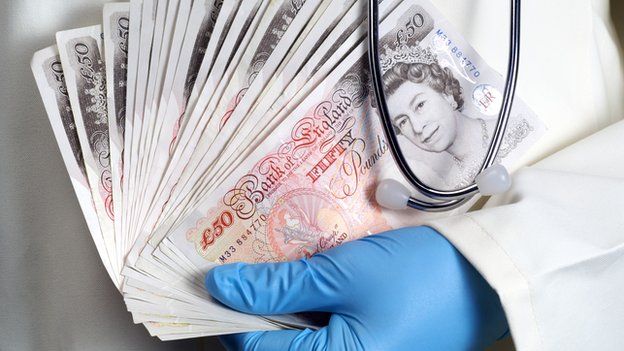How much will the chancellor give the NHS?
- Published

Will be £1.5bn or could it be £2bn? That's the debate around the higher echelons of the NHS in England as they await Chancellor George Osborne's Autumn Statement next week.
Since the call for £1.5bn extra for next year's NHS budget was made earlier this month there has been no downplaying of the idea in Whitehall.
It came from the health minister Norman Lamb in an interview with me and was met with a resounding silence at the Treasury.
Easy, you might have thought, for sources close to the chancellor, to dismiss the idea as the unrealistic political posturing of a Liberal Democrat.
There was no reaction either from Health Secretary Jeremy Hunt, who presumably would be delighted if Mr Osborne handed over a cheque.
Lib Dem leader Nick Clegg has also mentioned that £1.5bn figure.
Labour have called for an extra £1bn, paid for by banking industry fines, as well as the £2.5bn the party has pledged annually over the new parliament, part funded by a mansion tax.
All of this suggests that new money for health will be part of the Autumn Statement. But the question is now much?
Might the chancellor wish to appear to trump the Liberal Democrats and conjure up £2bn extra for the financial year beginning in April? The silence from the Treasury is deafening. Something is up.
Unusual times
However much new cash is cobbled to together for the NHS, the chancellor will no doubt present it as an example of the government's commitment to essential public services even at a time of austerity.
"Billions more for the NHS" is a headline he would be happy to see the day after the Autumn Statement.
But as far as NHS chiefs are concerned, a £2bn injection next year is the minimum needed to keep the service going without cuts to staffing and lower quality care.
For some months they have been concerned about a gap between anticipated demand for health care next year and the budget for 2015/16 already settled with the Treasury. I reported as much back in June.
It was no coincidence that the Kings Fund think tank and the group representing many health trusts, NHS Providers, both called for a £2bn boost for next year.
Without it, they argued, a financial crisis was looming. I sense they would not be satisfied with the £1.5bn mooted by Messrs Lamb and Clegg.
In normal times, finding £2bn from behind the sofas at the Treasury is not difficult. But these are unusual times.
Government borrowing is higher over the financial year to date than it was this time last year and Mr Osborne can only hope the budget watchdog the Office of Budget Responsibility (OBR) predicts the full year figure will be falling.
The last thing he really wants is to raise spending above existing plans.
'Difficult judgements and strong nerves'
All of the above is about next year. But the current financial year is throwing up major challenges.
Over the first six months of the year, health trusts in England were £630m in the red and that figure was recorded, even after a discreet injection of extra money by the government into the weakest trusts.
And that's before winter is here.
Of course the Department of Health's main concern is that the sums across the NHS balance at the end of the year.
If hospitals are running deficits but local commissioning groups are in surplus then all will be well. But it may be a close run thing by the time winter has run its course.
Keeping within budget will require difficult judgements and strong nerves - like landing a Harrier jump jet on one half of a tennis court according to one source.
This year's financial struggle underlines why health chiefs are so keen to see new money for next year.
If they only just squeak through this year, then the relentlessly rising demands on the service over the next 12 months, they reason, can only be met with added resources.
- Published26 November 2014
- Published10 July 2014
- Published7 July 2014